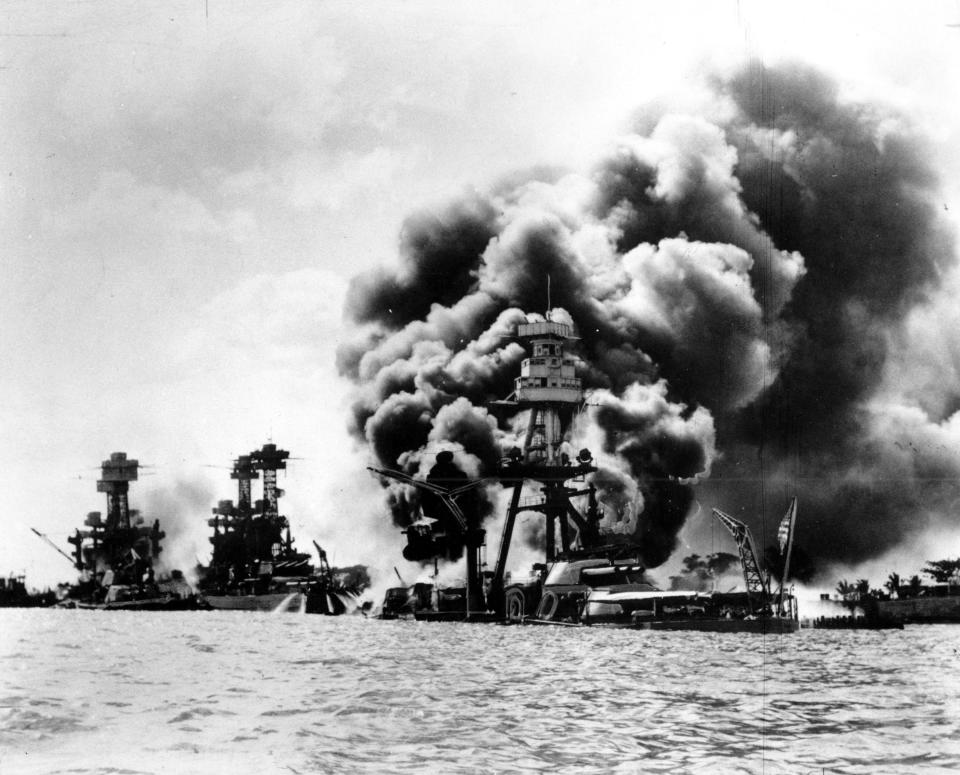Lenawee County history: County's response to Pearl Harbor attack was calm, determined
- Oops!Something went wrong.Please try again later.
Last time, I delved into Lenawee County life in the hours leading to the attack on Pearl Harbor, an act during World War II that pulled the United States into what was until that time a far-off war fought overseas.
On Dec. 7, 1941, Japanese Imperial forces attacked the island harbor where the U.S. military had ships and troops. News of the attack spread fairly quickly to the mainland, and the next day, President Franklin D. Roosevelt declared war on Japan.
The same day, Lenawee County residents spoke of the pending war and its effect locally. Irene Ackland Perry told The Daily Telegram she was concerned for her brother, William Ackland, and his wife, who lived in Wailuku on Maui. The former Morenci residents had last spoken with Perry about three weeks before, and “at that time he stated they were not worried about an attack from Japan and felt that everything was under control.” The Acklands eventually returned to Morenci.
More: Lenawee County history: The 'day before' – a look at Dec. 6, 1941
Rollo Winne, brother of Bertha Hoisington of Adrian, had been in defense work near Manila in the Philippines, and in a letter sent to his sister a few months before, Winne had written he wouldn’t be surprised if Japan forces would attack the Philippines at any time. Winne would eventually lose his life during the war in December 1944.

Adrian junior/senior high school home economics teacher Gretchen Miller said she was “extremely anxious” about the bombing at Pearl Harbor. Her brother, Lt. Carl Miller, was a member of the U.S. Army coast artillery unit and stationed at Pearl Harbor. His letter to her, received the Friday before the attack, had been censored and mentioned nothing about Hawaii’s war conditions.
The Civil Aeronautics Authority ordered all airplanes in Lenawee County grounded until further notice. No planes were allowed to take flight unless they were airline planes. Birth certificates of all pilots had to be presented before being allowed to resume flying. Ken Morey, manager of the Adrian airport, said the act “was directed at preventing any possible damage to vital plants and properties from bombing attacks.”
While Lenawee County residents were overall stunned by the news of the attack and already were using the term, “second world war,” life went on as normally as it could. The Croswell remained open. The countdown to Christmas continued.
“At most, the average man in the street expected an invasion of Thailand, or possibly trouble in the Philippines. Hawaii, well, now that was getting a bit too close to home,” read an editorial piece on the front page of the Telegram Dec. 8.
Subscribe Now: For all the latest local developments, breaking news, and high school and college sports content.
Citizens united to accept the challenge of war and to emerge victorious, the editorial went on to state.
“The new spirit swept over the Gerity-Adrian factory where employees subscribed to $2,000 worth of defense savings stamps today,” the editorial stated. “There was no cheering or whooping on the streets, just a calm deliberate determination to get the job done.”
— Dan Cherry is a Lenawee County historian.
This article originally appeared on The Daily Telegram: Lenawee County history: Response to Pearl Harbor attack calm, determined

